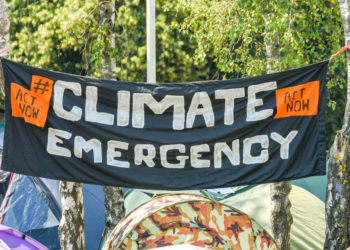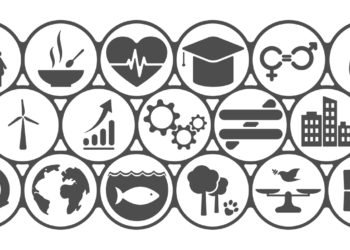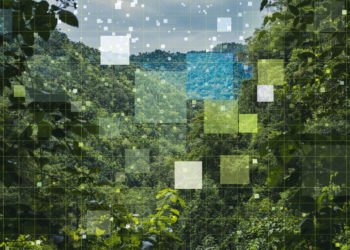Recently, I was preparing a talk for a NISO Plus 2022’s (February 15-17, 2022) panel on ‘Working towards a more ethical information community’. I started asking myself, if sustainable development works towards a just and ethical society, how does it deal with the Global North-South divide in the ethics of scholarly publishing?
The United Nations Sustainable Development Goals (SDGs) Framework connects a wide range of social, economic and environmental challenges — be it inequality in wealth distribution, food and water insecurity, or rapidly disappearing wetlands. The framework also inspires us to work together towards 17 common goals and 169 targets. Research and access to information and knowledge are not only crucial for national and global efforts to attain the SDGs by 2030, but also to measure our progress against the 232 SDG indicators. As part of a responsible industry, scholarly publishers acknowledge their role in sustainability actions. In addition to individual publishers, we see initiatives, such as the SDG Publishers Compact and the ALA adopting sustainability as a core value of librarianship. A couple of recent pieces on The Scholarly Kitchen have looked into the roles and opportunities for libraries and publishers in supporting the SDGs.

Research communication connects our research system with our efforts towards sustainability. Attaining the SDGs is essentially a result of appropriate use of research achieved through translating knowledge into action, like changes in our policies and practices — often branded as research impact. As a core component of our research ecosystem, research communication has a wide range of practical ethical dimensions. The COPE guidelines, for example, show that through guidance on diversity in managing authorship, editorial and peer-review processes, and retractions; ensuring Diversity, Equity, Inclusion & Accessibility (DEIA); managing relationship among Societies, their journals, and publishers; guiding research integrity; and investigating into potential misconducts in scholarly publishing.
The divide between the North and the South in scholarly publishing is often discussed and studied. We have also made some progress in reducing this gap, for example, in accessing research (e.g., Research4Life brings many global publishers under one umbrella to support the Global South), in publishing research (e.g., open access (OA) journals offer article processing charge (APC) waivers and discounts to researchers of Low- and Middle-Income Countries (LMICs)), and in reducing geographical inequity (e.g., by publishing regional OA journals). Although we don’t often talk about the North-South divide in publishing ethics, a recent study shows a large variation in the awareness of academic integrity at the universities in Africa, Asia, and Europe. Developing countries’ organized battles against predatory journals can also be seen on some rare occasions.
However, there remain situations in scholarly publishing, which may not seem quite right. In the name of academic responsibility, scholarly publishers expect peer reviewers to assure quality of research for free, while they charge readers, or their institutions for that matter, thousands of dollars to read one journal or charge authors thousands of dollars to publish one article. Imagine being a peer reviewer of a manuscript that you don’t have access to once the article is published, because your Southern institution can’t afford to subscribe that journal. Or think about a piece of research was done on your country, on your people, on your problem, but your country doesn’t have access to that published article.
Under global programs, like Research4Life, institutions of my Least Developed Country (LDC), Bangladesh, are now accessing thousands of journals for free and researchers are enjoying the APC waivers offered by many journals. But, all this will change in 2026, when Bangladesh will graduate from the LDC list. Do we realize that a change in a country’s economic status does not necessarily correspond with a change in that country’s research system and investments in it? Have we thought of any ethical coping mechanism for the researchers and authors of countries in similar economic transitions?
We need to ask ourselves, as we work toward the SDGs, can we really have an ethical scholarly community without addressing such a dynamic North-South divide? More specifically, are we contextualizing enough the ethical considerations of the North for the South as we address this divide?
Let me draw six situations to explain why contextualization is vital in reducing the above divide.
- A group of researchers from the LMICs say “Thank you very much for the access to global scholarly publications. While we access the global research, we will publish our research only locally.” Should we call it unethical since it exploits free access to global research literature without publishing in ‘global’ journals?
- High APCs may create “nationalistic scholarly isolation“, where Southern researchers, not being able to afford the APCs, are publishing research in local and regional journals. Can we blame the South for this?
- There are Southern academic institutions which demand their researchers publish in local and regional journals. Doesn’t it deprive Southern researchers from enjoying their freedom to publish? But, can we criticize their institutions for imposing such a restriction which may be needed for the survival of these journals and to make regional research freely accessible regionally?
- We see Southern researchers becoming coauthors of articles resulting from North-South collaborations and published in reputed journals only by supplying research materials, without significant intellectual contribution to the research or article writing. Should we hail such arrangement in the name of global scholarly inclusion?
- Many governments in the South are reluctant to embrace evidence-guided policy and practice change — they are guided by the data and information their national agencies collect, not by the knowledge their researchers create. Isn’t this mindset jeopardizing the role of research in achieving sustainable development and the SDGs in those countries?
- Can we expect Southern researchers and their institutions to abide by the ethical norms and guidelines articulated by the North without helping them to transform their systems or overcome their structural challenges?
So, to become a more ethical scholarly publishing community, we need to get inspired by SDG 17 (realizing global partnership for sustainable development), and
- Create a collective narrative of scholarly ethics, by engaging regional and international partners, by contextualizing the South’s issues, concerns, and realities;
- Work with the South to support their understanding and capacity of scholarly publishing standards, needs for structural changes, and evidence-guided actions for the SDGs; and
- Look beyond our current networks in the North. We need to learn from and capitalize on diverse regional and international experiences, perspectives, and expertise.
Discussion
4 Thoughts on "Connecting Sustainable Development, Publishing Ethics, and the North-South Divide"
Another thoughtful and thought-provoking article, Haseeb. You are right to unpick the complexity of the publishing ethics landscape and to examine it through a Southern lens. Creating a genuinely equitable research communication ecosystem involves so much more than offering free access or waiving publication charges! Something we can explore in more depth at our Researcher to Reader conference workshop later this month.
Thanks, Andrea.
Yes, you’re right. The Researcher to Reader (R2R) Conference on 22 & 23 February would give us a fantastic opportunity to discuss such less explored areas of global access to scholarly publication. I am sharing the link to the R2R programme with TSK readers, for more information: https://r2rconf.com/r2r-conference-programme/
Hello Haseeb, Your six questions are great discussion starters. (Some I think are rhetorical?)
“Let me draw six situations to explain why contextualization is vital in reducing the above divide…”
From a personal perspective, my initial thoughts are:
1. No
2. No
3. No
4. No
5. Yes – but this is a global issue, not specifically a LMIC issue
6. The way forward is to be progressively more inclusive in defining ethical norms and values, so that the perspectives of LMICs are properly represented
We are discussing these issues also on HIFA: http://www.hifa.org
Best wishes, Neil Pakenham-Walsh, HIFA coordinator
Thank you Neil, for sharing your thoughts. It is great to know that on the HIFA, you have also been discussing how to make ethical practices in scholarly communication more inclusive by actively considering the South’s concerns/challenges. All the best.



